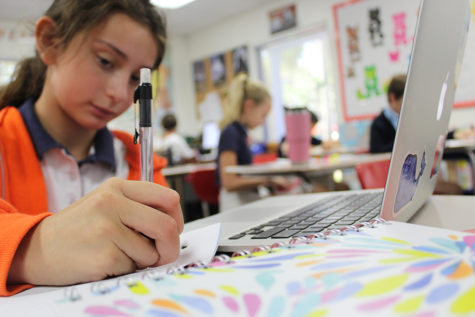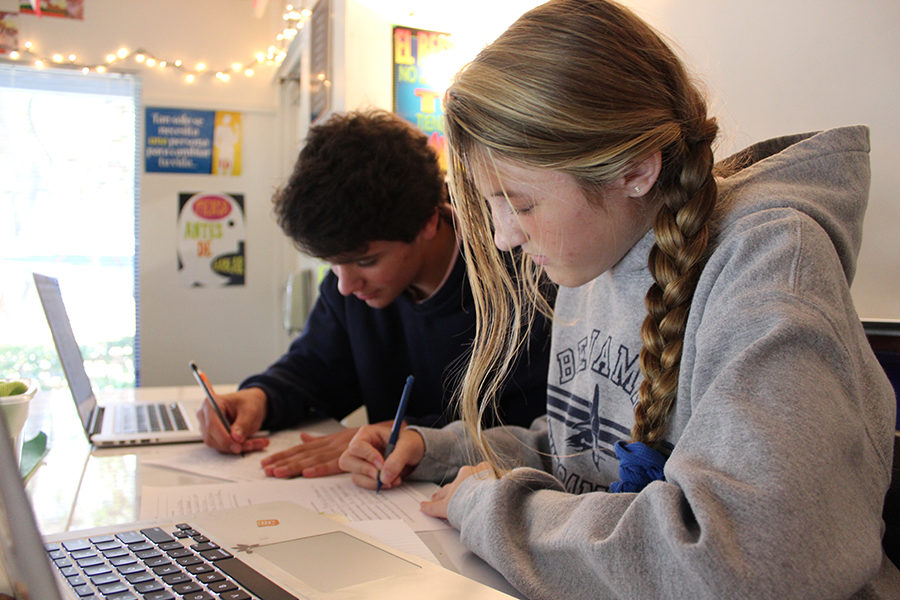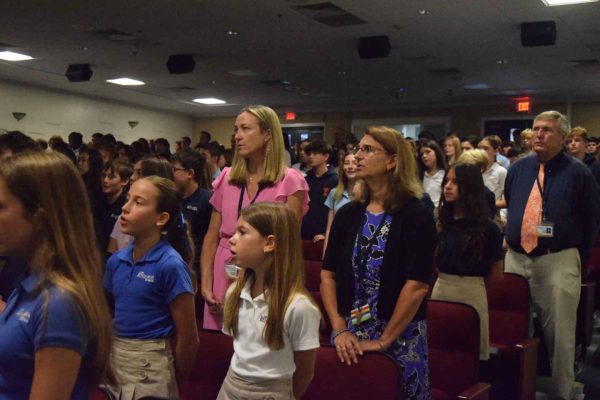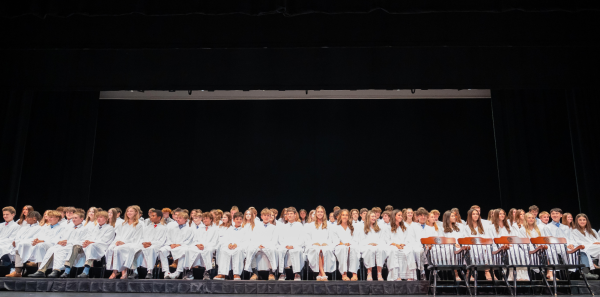New Study Halls a Stress Reliever for Students
Eighth graders Ryan Casey (left) and Kate Small get started on their assignments during Mr. Maddox’s study hall period on Tuesday, October 26, 2017.
English essays, annotations, pages of math problems, history projects about the 13 American Colonies, science vocabulary – these are just some examples of the homework assignments that weigh students down in the Middle School. One of the main reasons the homework load is more here than at other schools is that Benjamin is a college preparatory school, meaning it prepares students for the heavy workload they will face in college and beyond.
Since TBS was closed for seven full days in the wake of Hurricane Irma, teachers have been trying to quickly get up to speed with their curricula. As a result, students have been scrambling more than usual to find time to get their homework done. To take some pressure off of the students, the middle school administration has implemented a 35-minute study hall for students during the school day on Tuesdays and Thursdays.
The study halls take place from 12:50 p.m. to 1:25 p.m. during what was traditionally the 40-minute block lunch periods. However, the administration took some of the time from those lunches along with the 20 minutes allocated for RAAP (Reading Advisory Advocacy Program) at the end of the day to give the students these study halls. The study halls take place in the students’ RAAP rooms, which usually ends up being their advisory classrooms. However, if students choose, they can still read in the study halls if they don’t have any homework.
Many students are embracing the study halls and using it to their advantage.

Sixth grader Brynn Weisser gets a head start on her homework in Mrs. York’s study hall.
“I think it’s a great idea, so kids aren’t so focused on homework sometimes and they can go enjoy their lives [after school],” said eighth grader Will Dimaio. The study halls are especially good if a student plays a sport and can’t take advantage of ETC (Extra Time in Class) which is held after school from 3:30 to 4:30 p.m. Monday through Thursday. DiMaio also agrees that there is too much homework in the middle school: “Yeah…I feel like [the teachers] give us too much work to do, and we don’t have enough time to go have fun and go get exercise.”
Some students appreciate the study halls, but miss the down time allowed by the long lunches. “I do think [ the study halls] will help, but I wish we had long lunches again,” said eighth grader Casey Crawford. “It was fun to socialize with friends after I was done eating.”
Teachers also think the study halls are a good idea. “I believe Mr. Hagy understands the middle school students’ commitment to academics which is why he created a mid-day study hall for everyone,”said Math Department Chair Mrs. Cathryn Hansen. “I believe students have a very busy day. Not only do they go to school and play sports for the Middle School, but The Benjamin School also has students who play an additional travel sport or two, take additional music and dance classes, and are involved in additional activities,” she said. Hansen assigns 20-30 minutes of math homework, which she claims is enough to keep the student involved and not overwhelmed.
The study halls may be a permanent fixture in the schedule this year as they offer flexibility to students, allow extra time for teachers to grade and plan, and provide time for students to read any non-academic books if they still want to have a RAAP session.
The study halls came to fruition this year after the administration began an open dialogue with students and parents.
“We started working with Student Council last year regarding ways to help students get more work done during the school day,” said Head of Middle School Mr. Charles Hagy. “We started with RAAP and PE study halls [last year] a few weeks before exams. Next, we experimented with small study halls during the school day. Finally, we worked toward the schedule we are using now. Student, parent, and teacher feedback was very important to us during this process. Our student surveys were very helpful, as well.”
Student Council President Camilo Saiz, coincidentally, promised to work with the administration to make RAAP an optional study hall for students during his campaign in September. Although he didn’t know the administration was already planning the same thing, Saiz is happy the study halls have been implemented because of the large amount of homework this year. “I wanted study halls because I felt like the curriculum has been harder for all [of the] students, and it gives them a time to get work done and [meet with] teachers,” he said.





